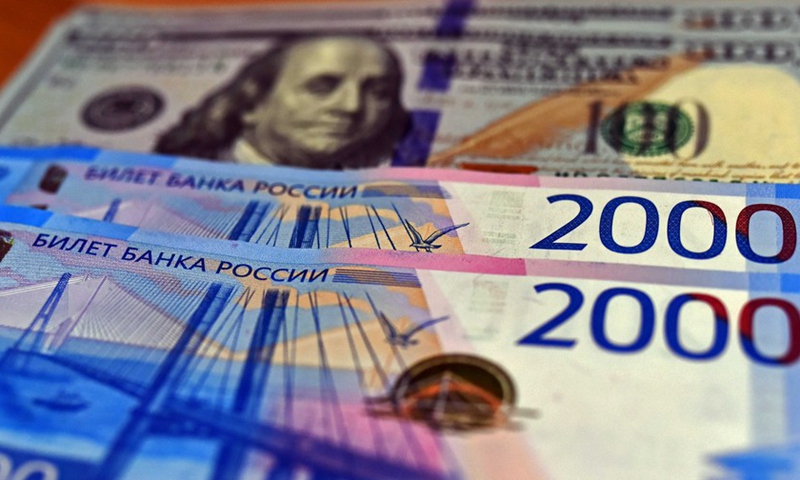
Russian ruble banknotes are seen with the U.S. dollars in the backdrop on March 2, 2021.(Photo: Xinhua)
US President Joe Biden said on March 26 in Warsaw, Poland that "the Russian Ruble has been reduced to rubble" thanks to Western-led sanctions. As exaggerated as it was, this claim is now met with a stark reality: The ruble has almost fully rebounded from its losses following Russia's "special military operation" in Ukraine.
This has profound implications for the realities of modern international conflict because, while the conflict in Ukraine is clearly a proxy between the West and Russia, the West is joining the fight purely in the economic and media spheres. This is where modern wars are fought and on this new, modern battlefield, the West has found that it overestimated its capabilities.
First, a word on what these sanctions were actually meant to accomplish. They were designed to hit the Russian economy and rattle Russian citizens, prompting outrage against the Russian state and lead Moscow to reverse course. It's true that many Western companies have pulled out of Russia and Western luxury goods are no longer accessible - but the hyper-inflation that the US and its allies hoped for is not happening.
It appears that luxury goods and fast-food chains are not so indispensable for the Russian economy. What is, however, indispensable is energy and that happens to be a very lucrative industry right now.
Europe is still dependent on Russian liquified natural gas (LNG) and although some EU member states are ditching Russian oil, replacing Russian LNG is impossible at the moment. This is why the US is stepping in to fill this potential gap, likewise increasing its own political foothold in Europe while reducing dependence on Russia.
Meanwhile, countries like India, traditionally non-aligned, are buying Russian oil at a discount. Indian Oil Corp, the country's largest oil refiner, bought three million barrels of Russian crude oil recently.
This is, in fact, the exact reason why the ruble has not been reduced to rubble, as Biden said. One glance at a map of countries joined to these sanctions shows that they are concentrated in North America and Europe, along with a few junior partners in the Pacific. It deserves reflection as to why this is.
To be sure, the international community, e.g., the majority of countries in the world, made clear in a UN General Assembly resolution that they condemn Russia's military operation in Ukraine. However, only a few dozen countries have joined economic sanctions. With myriad inflationary pressures, including the ongoing COVID-19 pandemic and the effects of climate change, it's not hard to see why countries would see it as going against their interests to string up supply chains by cutting ties with Russia.
And this is what it's really about, and why Russia has been able to keep its currency afloat amid pressure from the West. Globalization has always been about reducing friction - that is, obstacles between products, services and their consumers. The United States and its allies might have believed that globalization meant open season for its capitalist class but it has had, as it was so argued, the effect of creating an interconnected world economic system that aims to reduce friction wherever possible.
The sanctions against Russia represent an attempt to de-globalize, i.e., to re-impose friction, de-streamline processes and generally make conducting business more difficult. In turn, the majority of the world has decidedly rejected this on the basis that it is against their interest, not only because of the long-term implications and the precedent it could set, but because of their immediate material interests.
Asia is dependent on Russian fossil fuels and countries like India stand to benefit from lower prices. The African continent is dependent on Russian (as well as Ukrainian) wheat and couldn't fathom cutting this tie without the risk of food hyper-inflation or even starvation. This is globalization at work - and, yes, it works.
Long-term, Russia has long warned about the implications of unilateral sanctions and has worked with a number of countries under such conditions on sanctions relief. This has helped create a bloc of countries willing to cooperate on these issues and even helped some countries, notably Venezuela, reverse their economic woes and see economic gains and stabilized inflation for the first time in a long time.
There is certainly a story out there somewhere about some monetary wizardry by Russia's central bank but the important piece of why the ruble has stabilized is that de-globalization has been proven to be impossible. It is a permanent feature of the global economy.
The author is a Prague-based American journalist, columnist and political commentator. opinion@globaltimes.com.cn




